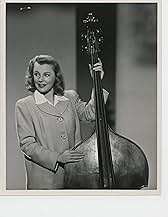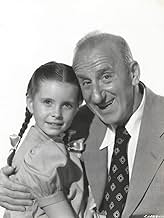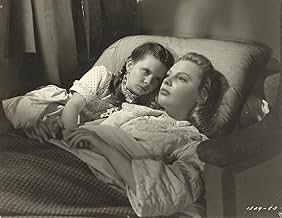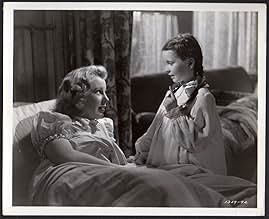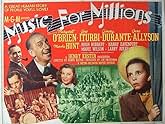Six year old "Mike" joins her sister Barbara Ainsworth who plays in a classical orchestra during WW II.Six year old "Mike" joins her sister Barbara Ainsworth who plays in a classical orchestra during WW II.Six year old "Mike" joins her sister Barbara Ainsworth who plays in a classical orchestra during WW II.
- Nominated for 1 Oscar
- 4 wins & 2 nominations total
Madeleine Lebeau
- Jane
- (as Madeleine LeBeau)
- Director
- Writer
- All cast & crew
- Production, box office & more at IMDbPro
Featured reviews
Music that covers every genre of the time and a wonderful performance by June Allyson as the expectant war bride who works playing a bass fiddle for Jose Iturbi's orchestra are the main hallmarks of Music For Millions. Of course the big name in the cast for the time is little Margaret O'Brien who was winning hearts all over the USA during the World War II years.
There were numerous films during those years that covered women doing all kinds of work in occupations for men. Why would playing in a symphony orchestra be different. Jose Iturbi is hemorrhaging male musicians in his orchestra to the draft and his ensemble was starting to look like Phil Spitalny's band.
One fine evening Allyson's little sister Margaret O'Brien comes to town and interrupts a concert at Carnegie Hall. Iturbi and orchestra manager Jimmy Durante are put out, but the women in the orchestra really take to O'Brien the way America did. Even Iturbi and Durante come around and Margaret becomes a kind of mascot.
A real crisis erupts when a War Department letter arrives for Allyson, but she doesn't get it courtesy of her fellow musicians. June is pregnant now and the women figure no news is good news until she has the baby. One of June Allyson's best acted scenes is with Iturbi where she confesses how frightened she is not knowing and hoping for the best for her husband out in the Pacific.
Iturbi does some classical music and appropriately the film ends with Handel's Hallelujah Chorus and why appropriate you watch the film for. And Jimmy Durante is his own comic self and his rendition of Umbriago is a film highlight.
Women certainly play in orchestras now. I live around the corner from the Kleinhans Symphony in Buffalo and I see many a female musician parking their cars and carrying their instruments to the hall. And we have a female conductor named Joann Falletta. This review is dedicated to her.
There were numerous films during those years that covered women doing all kinds of work in occupations for men. Why would playing in a symphony orchestra be different. Jose Iturbi is hemorrhaging male musicians in his orchestra to the draft and his ensemble was starting to look like Phil Spitalny's band.
One fine evening Allyson's little sister Margaret O'Brien comes to town and interrupts a concert at Carnegie Hall. Iturbi and orchestra manager Jimmy Durante are put out, but the women in the orchestra really take to O'Brien the way America did. Even Iturbi and Durante come around and Margaret becomes a kind of mascot.
A real crisis erupts when a War Department letter arrives for Allyson, but she doesn't get it courtesy of her fellow musicians. June is pregnant now and the women figure no news is good news until she has the baby. One of June Allyson's best acted scenes is with Iturbi where she confesses how frightened she is not knowing and hoping for the best for her husband out in the Pacific.
Iturbi does some classical music and appropriately the film ends with Handel's Hallelujah Chorus and why appropriate you watch the film for. And Jimmy Durante is his own comic self and his rendition of Umbriago is a film highlight.
Women certainly play in orchestras now. I live around the corner from the Kleinhans Symphony in Buffalo and I see many a female musician parking their cars and carrying their instruments to the hall. And we have a female conductor named Joann Falletta. This review is dedicated to her.
You'd think that any movie with June Allyson and Margaret O'Brien, Hollywood's two most famous "town criers," would be miserable, but "Music for Millions" is wonderful. Yes, there are tears. But with Jimmy Durante, there's also plenty to laugh about...and with Jose Iturbi there is plenty to sing about, although of course Iturbi plays, and doesn't sing.
Iturbi is the conductor of an orchestra whose male members are being swallowed into the war effort (by the end of the movie, there's only one man left in the orchestra besides Iturbi). Allyson is a bassist (NOT a cellist) who is pining away for her husband, missing in action in the Pacific. O'Brien is Allyson's baby sister "Mike," an eternal optimist and fiercely loyal to her sister. Durante is the manager, a frustrated musician himself and saddled with always making plans for things that you just can't make plans for.
Really, the star of the movie is the music itself, and it's some of the best you'll hear. Iturbi's "Clair de Lune" alone is enough to bring tears, and the first movement of Grieg's piano concerto--most of which we get to hear, when O'Brien isn't interrupting--is majestic. Durante has two numbers of his own, both hilarious reminders of why he was so well-liked.
I figure I'm pretty cynical, but even I was smiling through tears at the end. This is a terrific movie.
By the way, if you're interested in Jose Iturbi, please visit my new website, www.manyfountains.com to learn more about this great pianist and conductor.
Iturbi is the conductor of an orchestra whose male members are being swallowed into the war effort (by the end of the movie, there's only one man left in the orchestra besides Iturbi). Allyson is a bassist (NOT a cellist) who is pining away for her husband, missing in action in the Pacific. O'Brien is Allyson's baby sister "Mike," an eternal optimist and fiercely loyal to her sister. Durante is the manager, a frustrated musician himself and saddled with always making plans for things that you just can't make plans for.
Really, the star of the movie is the music itself, and it's some of the best you'll hear. Iturbi's "Clair de Lune" alone is enough to bring tears, and the first movement of Grieg's piano concerto--most of which we get to hear, when O'Brien isn't interrupting--is majestic. Durante has two numbers of his own, both hilarious reminders of why he was so well-liked.
I figure I'm pretty cynical, but even I was smiling through tears at the end. This is a terrific movie.
By the way, if you're interested in Jose Iturbi, please visit my new website, www.manyfountains.com to learn more about this great pianist and conductor.
10dickmass
This little movie is a warm, loving, funny movie full of hope and faith from a 7 year old child in a time of World War. They don't make them like this any more, plain acting NO special effects. You can't find it on any type of video, though I can't imagine why, with all the trash being brought out today. If you can catch it on one of the movie channels DO NOT MISS IT; grab something warm to drink and some tissues.
I know we live in a different world than we did in 1944, but its surprising to find a mainstream studio film that has a "power of prayer" theme. A beautifully told, sweet and honest story with (I'll have to admit) lots of overly sentimental scenes, this movie is about hope, and prayer, and belief in a higher power during difficult times. We have forgotten what it feels like to live in a world where most everyone was united against a clearly defined evil, and, I think we have to admit, a country that was much more united in its views of God and faith. I celebrate the diversity of today and am proud of our country because of it, but this ancient world of 1944 did exist. And it is worth celebrating too.
This is a wonderful movie, where the trauma from a war, which invades all countries during all wars, is seen through the eyes of a child. A brilliant actress, Margaret O'Brien, takes viewers through the torment of WWII, praying for the safe return of her sister's husband. I taped this movie when it played on TCM, and I've watched it many times, because it sends multiple hidden messages to those who watch with wisdom. The movie exposes a woman's fear of losing the father of the fetus in her womb. That fear is something that people continue to experience in today's world. Adults in the movie learn from the wisdom of the little girl, Mike, who helps her sister during this struggle. During WWII the music in this movie was marvelous for millions; it's quite inspiring to viewers today, as well.
Did you know
- TriviaIn a scene in which June Allyson and Margaret O'Brien were supposed to cry to harmonica player Larry Adler's rendition of "Clair de Lune," the six year-old star asked director Henry Koster, "Shall I let the tears run all the way down my face, or shall I stop then halfway down?"
- Crazy creditsAfter "The End," the following message is seen: "To families and friends of servicemen and women: Pictures exhibited in this theatre are given to the armed forces for showing in combat areas around the world---War Activities Committee, Motion Picture Industry."
- ConnectionsReferenced in Top Secret ! (1984)
- SoundtracksClair de Lune
(1890) (uncredited)
Written by Claude Debussy
Performed by Larry Adler on harmonica
Also performed by José Iturbi on piano
Details
Box office
- Budget
- $1,744,000 (estimated)
- Runtime
- 1h 57m(117 min)
- Color
- Aspect ratio
- 1.37 : 1
Contribute to this page
Suggest an edit or add missing content

